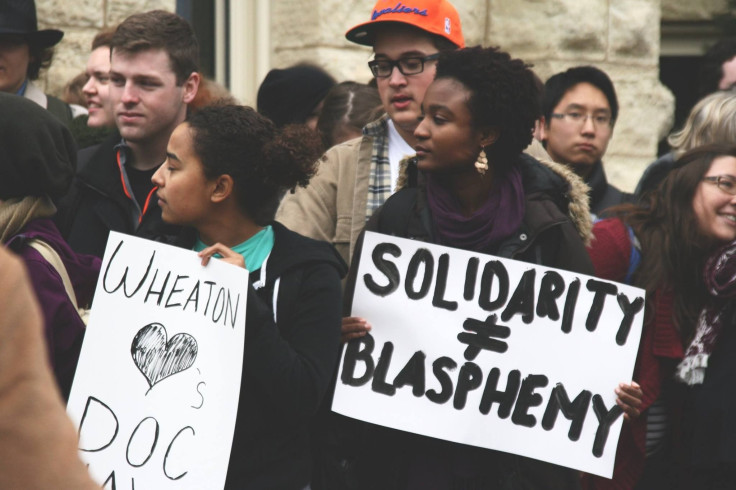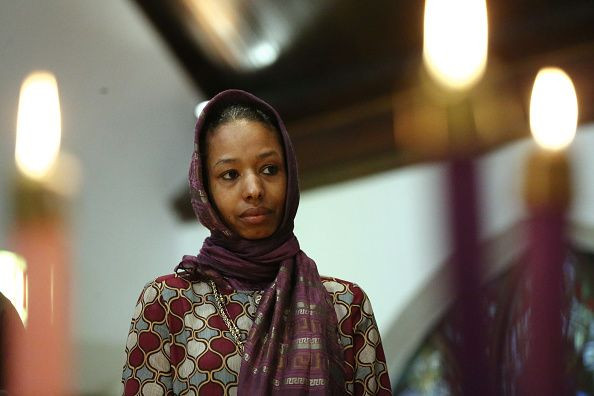Evangelicals Debate Whether Muslims And Christians Worship The Same God, In The Wake Of Wheaton College Controversy

Do Muslims and Christians worship the same God? The question — which theologians have debated for centuries — is at the heart of a controversy swirling at Wheaton College, a private evangelical Protestant school outside of Chicago, which this week suspended a political science professor for asserting that the answer is yes. But as students and alumni protest the administration's decision, the debate highlights how the evangelical Christian community doesn’t always act as a monolith.
“In evangelicalism, there’s an ongoing question about how you talk about what you mean by ‘God’ within the three monotheistic religions," Judaism, Christianity and Islam, said Vincent Bacote, a professor of theology at Wheaton, which has about 2,400 undergraduates and 480 graduate students. “Evangelicalism is incredibly broad. It’s an umbrella term for various forms of what you would call Bible-committed Christianity.”
According to the Pew Research Center's 2014 Religious Landscape study, about 25 percent of Americans consider themselves evangelical Christians, which encompasses a large subset of denominations such as Baptists, Methodists, nondenominational congregations and many in between.
Miroslav Volf, a professor of theology at Yale University and author of “Flourishing: Why We Need Religion in a Globalized World,” added that evangelical Christians have grappled with theological questions like the one raised at Wheaton for decades.
“On this issue, and on many other issues, there is significant division within the evangelical community. It’s a mistake to think of the evangelical community as a unified whole,” said Volf, who is also the founder and director of the Yale Center for Faith and Culture, which has published a series of essays by various religion scholars who have different opinions on the question.
The issue erupted this week after political science professor Larycia Hawkins, a Christian and the only black woman tenured at Wheaton, posted on Facebook to express solidarity with Muslims by donning a hijab (headscarf) and saying that Muslims and Christians are both “people of the book.” That phrase used in the Quran to describe Jews, Christians and Muslims. (Islam venerates ancient Israelite figures like Abraham, Moses and David as prophets. Muslims believe that Jesus Christ was a prophet, but not divine, as Christians do.) Hawkins also agreed with Pope Francis’ assessment that Muslims and Christians alike worship the same god.
But not everyone thought her statement was so benign. The post prompted the college administration on Tuesday to place Hawkins on administrative leave for violating the school’s “Statement of Faith,” a document all faculty members must affirm each year. The next day, about 100 protesters staged a sit-in at the the college president’s office to protest the suspension of Hawkins, which means she is on paid leave through the end of the spring semester. Supporters also launched a Change.org petition calling for the administration to reverse the move. It has received more than 2,000 signatures so far.
The incident at Wheaton has prompted religious scholars of all stripes — ranging from academic theologians to everyday worshipers on Twitter — to address the question of whether the three monotheistic faiths do in fact worship the same God.
“Some recent faculty statements have generated confusion about complex theological matters, and could be interpreted as failing to reflect the distinctively Christian theological identity of Wheaton College,” the administration said in a statement on Wednesday. "Dr. Hawkins’ administrative leave resulted from theological statements that seemed inconsistent with Wheaton College’s doctrinal convictions, and is in no way related to her race, gender or commitment to wear a hijab during Advent."

It’s not the first time Wheaton’s strain of evangelicalism has stirred controversy. In 2008, three administrators, including the then-president, pulled their signatures from a letter of solidarity with Muslim leaders because they believed the letter suggested Christians and Muslims worship the same God. And in 2006, the school fired a professor who converted to Catholicism. But students at Wheaton also have a history of activism. Most recently, a coalition of students penned an open letter decrying statements by Jerry Falwell Jr., president of Liberty University in Virginia, who recently called on students to "end Muslims."
No Contradiction
Volf, whose work was quoted by Hawkins in a follow-up Facebook post on Sunday, also wrote a piece for the Washington Post on Thursday arguing that Hawkins’ statements did not contradict Christian theology — and asserting that the backlash stems from “enmity toward Muslims, taking on a theological guise of concern for Christian orthodoxy.”
“She did not insist that Christians and Muslims believe the same things about that one God. She did not state that Islam and Christianity are the same religion under a different name, or even that Islam is equally as true as Christianity. She did not deny that God was incarnate in Christ. Neither did she contest that the one God is the Holy Trinity,” wrote Volf. “In fact, by having signed Wheaton’s Statement of Faith, she affirmed her belief in God as the Trinity and Jesus Christ as God and man, fundamental Christian convictions which, among other things, distinguish Christian faith from Islam.”
Meanwhile, Bacote said Wheaton’s Statement of Faith is also a broad one that encompasses evangelical belief — and that Hawkins’ initial post prompts further questions about its compatibility with evangelical theology.
“Her statements were not sufficiently clear. If you use the phrase ‘same God’ for Jews, Christians and Muslims, you have to ask further questions. Nothing she’s written or said gives any description beyond that statement. ‘Same’ doesn’t tell you if it means total equivalence or if distinctions are being used,” said Bacote.
Volf added that evangelical Christians have generally considered Jews to worship the same God — “until the debate about Muslims and Christians emerged. Then you had some very conservative evangelicals suggesting that Christians and Jews don't worship the same God, but in the past, only bona fide heretics have said the God of the Old Testament is different from the God of the New Testament. Because that would mean saying that David and Abraham worshiped a false God.”
My God Or Yours?
The Wheaton affair has renewed debate on the issue among theologians. Scot McKnight, a scholar of the New Testament, recently wrote a response to Volf, arguing that "we don’t worship God in the generic. We worship either the God of Abraham and Moses, the God of our Lord Jesus Christ, or the God of Mohammed. The God in each of the faiths is understood differently enough to conclude that saying we worship the 'same' God muddies the water."
Bacote also cautioned that the full story is not known to the public, and that it’s possible the administration did try to seek clarification on Hawkins’ views first. But Hawkins said in a press conference on Wednesday that the administration did not ask for clarification — it simply suspended her on Tuesday based on her Facebook posts. Hawkins was asked to write a "theological statement" for the administration to review, which she submitted on Thursday. She was also asked to complete her grading for the fall semester.
Many Wheaton students protesting the suspension of Hawkins, who seems to be a beloved professor on campus, said it was unfair of the administration to place her on administrative leave without further exploring the views she posted on Facebook.
“She was suspended without getting a chance to clarify. We’re standing in solidarity with her to get the fair process,” said Matthew Adams, a junior studying communications.
“Dr. Hawkins is one of the most academically rigorous, theologically orthodox, caring professors I’ve ever had,” said Wyatt Harms, a 22-year-old political science major at Wheaton who was one of the chief organizers of the protests. Harms, who describes himself as an evangelical Christian, also said that Hawkins’ Facebook posts did not contradict the college’s Statement of Faith.
“The college pandered to its conservative base, and now they’re stuck in a hole because they’re wrong,” said Harms. “Throughout the centuries Christians and Muslims have believed they worship the same God. And if the administration believes she is in conflict with the Statement of Faith, they haven’t given a specific reason as to how. That’s not how academia works.”
Harms also said some protesters suspect Hawkins’ race and gender may have played a role. “They say that Islamophobia and race aren’t operative in the decision, but they absolutely are. They would not be doing this to a white male professor, because they would respect his theological opinion enough to have a discussion before placing him on probation,” he said.
But Nathan Simons, a senior at Wheaton who has also taken courses with Hawkins, says that, as an evangelical Christian, he supports the administration's decision to put Hawkins on leave.
“She was misrepresenting the college and our Statement of Faith. She publicly said something that is completely contrary to what our institution believes,” said Simons. “We believe in the Trinity: Jesus Christ, the Holy Spirit and God the Father. Muslims do not believe that Jesus is God, so they can’t say they believe in our God, which includes Jesus Christ. Evangelicals agree on this.”
Simons, who was one of a handful of counterprotesters on Wednesday, believes the number of students protesting the suspension has been overblown. “It’s a small minority of Wheaton students who are protesting this,” he said, pointing to a website that seemingly thanks the Wheaton administration for its handling of the incident, which features hundreds of signatures.
Alumni and faculty have also weighed in on the debate. Brian Howell, a professor of anthropology at Wheaton, made a public post on Facebook supporting Hawkins. “She is a good friend, and a Christian of deep and thoughtful faith. Each year, when she signs the Statement of Faith, she thinks and prays, signing with great integrity and honor,” wrote Howell. “She desired to do something beyond words to show Christian love at a time when some Christians were making a mockery of the command of Christ to love our neighbors as ourselves.”
While we can tautologically say that all three claim to worship the "God of Abraham," that does not mean that each worships the same god.
— Matt Emerson (@M_Y_Emerson) December 17, 2015John Stackhouse, an academic who earned his master’s degree from Wheaton, wrote online that while he personally knows both the president and provost of the school, he was “scratching my head over Wheaton’s decision.”
Stackhouse wrote that evangelical Christian missionaries do not argue that Muslim converts to Christianity have found an entirely new God. They “routinely testify that they did not change gods, but came to understand the One True God better ... and especially to understand Jesus Christ as not merely a highly regarded prophet but as the divine-human Lord and Saviour ...We evangelicals would do well, once more, to listen to our own missionaries more and to heed those I call our ‘watchdogmatists’ perhaps less.”
Neither Wheaton College nor Hawkins responded to requests for comment, but Hawkins said in a statement on Thursday that her “motivation is to demonstrate Christ’s love during a time of profound marginalization of our Muslim brothers and sisters. I act out of my love for Jesus and His call for me to love all my neighbors. I am committed to engaging in dialogue with appropriate colleagues at Wheaton toward the goal of reaching reconciliation so that I may continue to live out my vocation as a Christian scholar and teacher with my faculty colleagues and my remarkable students."
© Copyright IBTimes 2025. All rights reserved.





















